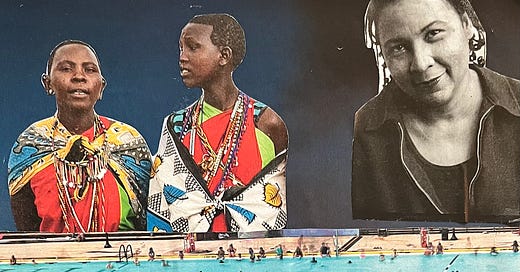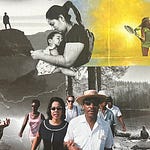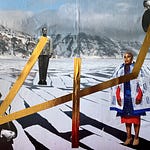🎧 Listen to the Essay and/or Meditation 🎧
Why, yes, those are 2 separate audio links – 1 below, 1 above. || My reading of this essay is right before the opening Hi friends. 👇🏾 || A guided meditation is at the top of this email. 👆🏾 || An archive of meditations lives here.
Listen to me read this essay:
This is the fourth in a 4-part series based on my online course, Love Club. You can find all posts here.
Hi friends
🌈 Happy Pride! 🌈
How are you? There’s still no lack of turmoil in the world. I hope you’re taking inspiration from the many movements towards justice developing around our precious planet. I also hope you’re finding refuge offline, with nature, in community.
I’m writing to you from my friend Jocelyn’s where I’m staying for a creative retreat, mapping out ideas for my next book. I’ve been joking that this is a writing plus physical therapy residency because while here I’m rarely walking on concrete and mostly on uneven surfaces of actual Earth. I can feel the difference even walking back and forth from her house to the small studio across the yard, as nature provides my muscles and joints the dynamic training they apparently craved. Jocelyn kindly gifted me this time to be amongst the trees as I explore what wants to emerge for this nascent project of mine. So far the exploration involves poster paper, colorful markers, and dance breaks. This newsletter will be shorter than usual because of said dance breaks and trees.
We’ve reached the fourth and final installment of Love Club where we will highlight the head center, arguably the trickiest of the three intelligences (because the thinking mind is involved). How do we know love? Or how do we know that we know love? Love is fundamentally an idea, and it’s our minds that allow us to engage the concept, to investigate its nuances.
Here is the final statement for this series:
“Self love cannot flourish in isolation.” — bell hooks, All About Love
I don’t think we can truly know love unless we know self love. Yet, most of us are never taught to love ourselves. In fact, media and advertising teach us the opposite. Capitalism requires feelings of deficiency. I cannot be a diligent consumer if I truly love myself. My own challenges with self love definitely correlate to the societal messages I received growing up. The many mainstream, whitey-white fashion magazines I devoured as a teen promoted a narrow representation of beauty and belonging. Still, I plastered my bedroom walls with those pages filled with eighties super models. As well, in my immigrant community, I absorbed the preference for lighter skin when told not to stay in the sun too long. Beyond warped beauty ideals, my challenges with self love related to all the areas I felt myself lacking: as a dutiful daughter, a good student, a fun friend. How can a dark-skinned, nerdy, immigrant girl know she’s lovable without having to prove it through obedience, good grades, and conformity?
I believe it’s impossible to know self love without self compassion, impossible to practice self compassion without untangling from shitty systems, and impossible to undo these systems without self care. None of this happens in isolation.
Many ideas get conflated with self love including self confidence, self esteem, self compassion, and self care. If you don’t know the work of Dr. Kristen Neff, I encourage you to explore her powerful framework and practices for self compassion (including how confidence and esteem cannot replace the need for compassion). Neff identifies three aspects to self compassion: 1) Self kindness vs. Self judgment 2) Common humanity vs. Isolation. 3) Mindfulness vs. Over-identification. Again, I invite you to explore her work. And I’d like to make the case for a possible fourth aspect of self compassion—one that helps to identify the deep cultural conditioning that prevents us from knowing self love… 4) The Systems Stink. Without naming that the systems stink, I inevitably blame myself and other individuals for all the ways I feel diminished and degraded. Some of my relatives held horrible ideas about skin color. I don’t know when colorism entered Ethiopian and Eritrean societies or whether it arrived with European contact. I do know people are taught horrible ideas through systems, that no one conspired individually to prevent my self love. Undoing these systems against self love means changing people, plural.
The most visionary models of self love always center community care. The 1970 book, Our Bodies, Ourselves, grew out of feminist consciousness-raising groups. Until then, women had been discouraged from asking questions about their own health and were required to depend on male experts who knew little about female bodies. Groups of women recognized a need for better information about women’s healthcare, created it, and, along the way, invited women to actually look at and love their own vulvas. Or consider the various actions of the Black Panther Party. Rooted in Black pride, they created powerful pograms to counter the effects of systemic racism including school breakfasts, free food sites, prison reform, community acupuncture and voter registration. Self love is never separate from loving care in relationship.
If I want to know self love, I must uproot my own unloving thoughts. This requires caring for myself. However, self care is often presented as a solo endeavor which it never ever can be. Even isolated acts of self nourishment depend on time and resources inevitably tied to others (human or non-human): fresh air, childcare, bodyworkers, a studio in the woods to write and dance 🥰.
In the end, it always comes back to mindfulness, to an awareness of what’s happening within and around me—enough to understand when I’m running the crappy code I’ve downloaded from the culture. It’s up to me to notice and interrupt those thoughts. And, I could never rewrite those scripts without the input of others. I learn from the women of the Boston Women's Health Book Collective and the members of the Black Panthers, from my friends who affirm the dysfunction of my family of origin, from the brave bodies who block ICE and call for loving our immigrant community members.
I wish for all of us self care rooted in loving relationships. May we all know true self love.
With love,
Sebene













Share this post